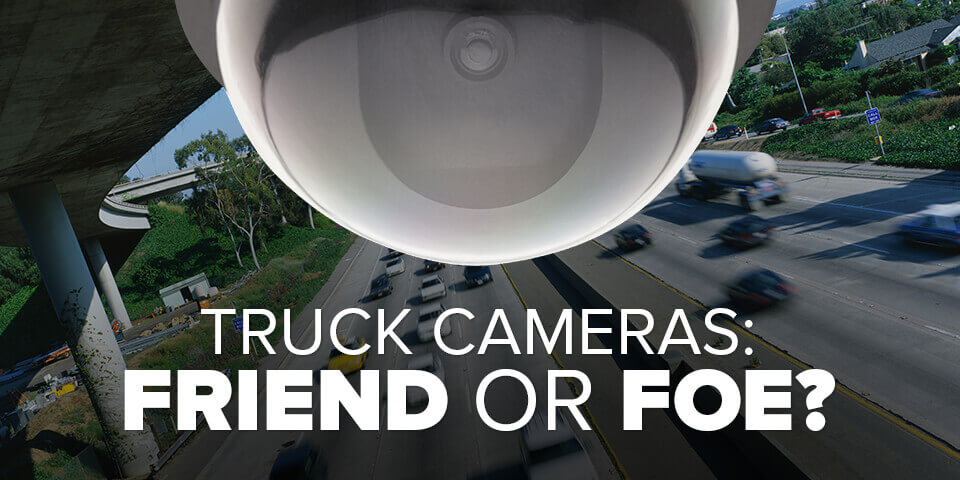Truck Topics

Truck Cameras: Friend or Foe?
Are truck cameras your friend or foe?
The answer depends on the point of view of the stakeholder ... and that of the camera, whether it's facing the road, or back at the driver, or both.
If you're a fleet owner or in charge of safety for a motor carrier, then you're inclined to want the most comprehensive system possible -- with forward-facing cameras that capture events happening in front of the vehicle and driver-facing cameras that track the movements of drivers -- to protect your investment, your brand and your drivers.
But what if you're coming from a driver's perspective? In this case, the friend vs. foe debate hinges on the position of the camera -- forward-facing vs. driver-facing.
Forward-Facing Cameras
The reason why drivers might consider forward-facing cameras as a "friend" is because those devices can help exonerate drivers from fault when involved in a traffic incident.
For example, truck camera manufacturer SmartDrive published a case study about trucking firm Verst Group Logistics, reporting that five Verst drivers were exonerated in one year with the help of forward-facing videos.
The operations manager at Verst, shares this example in the case study: "We had a collision with one of our trucks and a pickup. The camera caught the pickup hitting a guardrail and coming over the highway divider. That pickup driver tried to say our truck hit him. Once we reviewed the footage, it did show the pickup hit our truck. Police officers initially listed no fault, but once we showed them the video they faulted the pickup driver."
That type of footage is valuable to both the motor carriers (to reduce cost of claims) and drivers (to protect their record and reputation).
"Forward-facing cameras are more accepted by drivers," says John Elliott, chief executive officer for Load One LLC, an expedited trucking carrier headquartered in Taylor, Mich. "And there's a lot of owner-operators now buying forward-facing cameras themselves. When seventy to eighty-percent of incidents on the road are caused by the car and not the truck, why would you not want a forward-facing camera? That's a tool that can vindicate you seventy, eighty-percent of the time."
Driver-Facing Systems
But cameras pointed back at the driver? That's a bit more complicated.
"I don't think there's too much controversy about the forward-facing camera. It's the inward facing camera that tends to be the firestorm of controversy. It's a challenge because you're trying to balance safety and technology with privacy," says Elliott.
Fleets sell the benefits of driver-facing systems to drivers in terms of being able to provide footage and feedback to help coach drivers.
For example, a case study on transportation logistics firm NFI Industries, published by truck camera provider DriveCam, quotes NFI's senior vice president of risk management, saying that while drivers tend to initially be resistant to video event recording, NFI drivers embraced it. "The feedback from the drivers has been extremely positive. Most of them will tell you that they want the DriveCam Program in their trucks."
That's because, as the case study continues: "[Drivers] understand that the program isn't an invasive tool, but a training tool—as well as an opportunity to protect them and the company from events on the road that are outside their control."
But how do expediters feel about driver-facing cameras?
The opinions are mixed but many seem to be skeptical. Here are links to a few discussion threads that were created on this topic during the past year on ExpeditersOnline.com to give you glimpse into what expediters are thinking and feeling about this issue:
- http://www.expeditersonline.com/forums/threads/driver-facing-dash-cams.67592/#post-765169
- http://www.expeditersonline.com/forums/threads/driver-cams.65565/
- http://www.expeditersonline.com/forums/threads/which-expediter-will-be-the-first-to-use-driver-cams.66309/
One commenter, Tennesseahawk, says: "When doing research on t/t companies to work for, the first ones scratched off my list were the ones that instituted driver-facing cameras. It does no benefit to the driver. As was said, any look away/yawn/reach can be held against you, as if you had admitted to the crime yourself. ... If, by chance, they ever became mandatory, I'd be looking for a new career. I'm about tired of being treated like a robot, programmed by the government."
What about you? What are your thoughts? How do you view truck cameras -- friend or foe?
